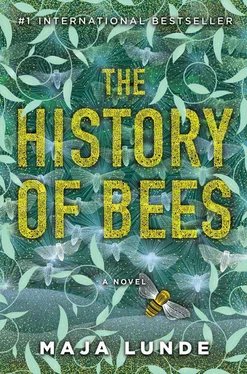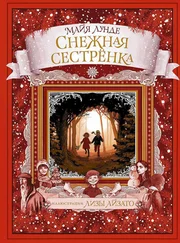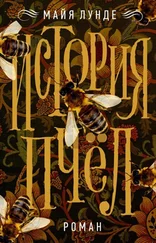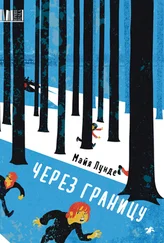She opened the door. The crying filled the room.
“The infant… ,” I said.
She stopped in the doorway.
I searched for the words. “Has somebody come to visit?”
She shook her head quickly.
“No. The baby is ours now.”
“But, how?”
“The mother died in childbirth. And the father, he’s not able to take care of it.”
“Who is he?” I asked. “Is he here?”
“No, Father.” She hesitated. “He’s in London.”
Suddenly I understood. I sat up halfway in the bed, tried to look at her sternly, to make her tell me the truth. “It’s his child, isn’t it? Edmund’s?”
She blinked rapidly. Didn’t answer, but she didn’t need to, either.
“I’m sorry,” she said again.
Then she turned away from me and left.
The door was left standing ajar behind her. I heard her quick steps on the stairway, how she went downstairs and walked swiftly across the floor down there.
“I’m coming.”
She stopped.
“I have him.”
Her voice became lower.
“There… there, now… there, there… shhhh…”
And then.
The faint, humming song of hers.
But now she wasn’t singing for me.
Finally she was no longer singing for me. She was singing for the baby she held in her arms, the baby she was slowly rocking.
The great shakes. They were in me. For days. Morning, noon, night.
I struggled to hold a knife and fork. Emma saw it, but said nothing. Struggled to use tools, dropped the screwdriver on the floor, the saw swerved awkwardly.
I awoke with fear in my heart every single morning.
Woke up, went down and met him. He just glanced up at me and gave a little nod before diving down into his book again. But that was fine.
Because he wasn’t shaking.
He didn’t falter. Even when he was turning the pages of a book, it was done with confidence in his movements, calm and assured, the cup of coffee lifted with a steady hand. The footsteps towards the field, towards the hives, exactly the same length, his strides strong and solid against the ground.
And I followed behind him. At all times with this trembling in me.
But as I witnessed these strides of his across the field, the lifting he did with his legs, not with his back, bend, lift, put down, again and again, as I watched these movements, I gradually stopped shaking. Every day it became easier to hold a fork.
And then, while we were extracting honey, while the autumn sun was low and gentle in the sky, just as yellow as the drops we shook off the frames, I suddenly noticed something. They were gone. The shakes were gone.
I worked with calm, stable hands. Like him. Beside him.
The two of us now completely in sync.
The hive was guarded, but the tent had been removed. The area was open all the way to the edge of the fields, right by the forest.
People had gathered at a proper distance, standing calmly and just looking at it. Nobody feared it, the bees weren’t dangerous, Wei-Wen’s allergy was an isolated case. Around us there were flowers on all sides, recently planted bushes, red, pink, orange, the same fairy-tale world I had seen in the tent, but which now extended across a large area, because the fruit trees had been chopped down and replaced by new plants.
The military had left. The fences were torn down. The cocoon had burst and the hive lived among us. The bees were allowed to fly where they wanted, completely free.
It was ten meters away from me, in the shadow of the trees, the sun shining on it through the leaves—not far from the place where the first wild hive had been found, not far from the place where Wei-Wen had been stung. Savage’s Standard Hive, just as Thomas Savage had drawn it in The History of Bees , the hive that had been in his family since 1852, the drawings of which had disappeared at some point in history, but the measurements and appearance of which Savage had memorized and drawn again. The hive had been intended for honey production and observation—that’s where he had wanted to tame the bees.
But bees cannot be tamed. They can only be tended, receive our care. Despite the original purpose of the hive, it was still a good home for the bees. In it everything was arranged to enable them to breed and reproduce. They kept the honey for themselves; nothing was to be harvested, never to be used by humans. It would be allowed to remain as nature had intended: food for the newborns.
The sound was unlike anything I’d ever heard before. In and out, in and out the bees flew. With them they brought nectar and pollen, nourishment for their offspring. But not just for the few that were their own; every single bee worked for the group, for all of the bees, for the organism they constituted together.
The buzzing pulsated through the air, made something vibrate inside me. A tone that calmed me, made it easier to breathe.
I just stood there like that. Tried to follow each individual bee with my eyes, see every individual bee’s journey from the hive, out to the flowers, from flower to flower, and back again. But I kept losing sight of them. There were too many of them, their movement patterns impossible to understand.
So instead I let my gaze come to rest on the whole, on the hive and all the life it surrounded itself with, all of the life to which it attended.
While I was standing there, somebody appeared beside me. I turned. It was Kuan. He was concentrating on the hive, lifting his head to get a better view. But then he discovered me.
“Tao.”
He came towards me. An unfamiliar gait, heavier, as if he were already old.
We stood facing one another. Kuan kept his eyes focused on me, didn’t look down, the way he often used to do. There were dark circles under his eyes. He was drawn, pale.
I missed him. Missed the person he’d been. The cheerful lightness in him, the contentment, the joy over the child he’d had. And the child he would have. I wished I could say something that would bring back this cheerfulness in him, but found no words.
We turned towards the hive, stood like that, side by side and looked at it. Our hands almost touched, but neither of us took hold of the other’s hand, like two teenagers who didn’t quite dare. The warmth between us. It was back.
A bee buzzed through the air past us, just a meter away, swerved to the right, a seemingly unplanned movement, then it flew between us—I could feel the tiny gust of air against my cheek—and then it disappeared into the flowers.
Then he took my hand.
I caught my breath. This time he was the one who dared.
Finally he touched me again. My hand grew small in meeting with his. He shared his warmth with me.
We just stood there, holding hands, while we looked at the hive.
And then.
Finally the words came that I had so yearned for.
Softly and clearly with a seriousness that was unlike him. Not something he said because he had to, but because he meant it:
“It wasn’t your fault, Tao. It wasn’t your fault.”
Afterwards, after we’d said farewell, I walked alone down along the wheel ruts. The bees were still vibrating inside me. And his words released words in myself.
I walked on, more and more slowly, until finally I stopped and remained standing among the fruit trees. Everything was open, no trace of the fences and the military, everything as before, like last year at this time. It was snowing yellow leaves. The ground was covered, the trees would soon be bare. All the pears were harvested, each one carefully picked, packed in paper and carried away. Pears of gold.
But on the horizon I could glimpse change. The endless rows of fruit trees had been broken up. The laborers were hard at work digging up roots and getting the trees up out of the ground. Thomas Savage’s vision had finally become a reality. We released our control and the forest would be allowed to spread. In the soil other plants would be sown, large areas would be allowed to remain uncultivated.
Читать дальше









